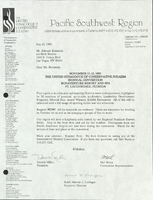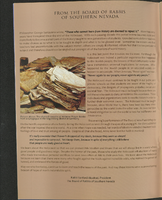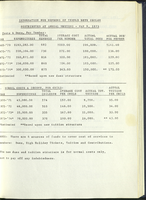Search the Special Collections and Archives Portal
Search Results

Long Range Planning Study for Temple Beth Sholom, July 1988
Date
Archival Collection
Description
This report provides the results of a study conducted by CITYWEST, Inc., to "determine whether the synagogue should remain in its current location and be renovated, remain in its current location and rebuild, or move." The report addresses leadership and staff development, as well as programming recommendations.
Text

Transcript of interview with Ruth Urban by Barbara Tabach, August 24, 2015 and September 16, 2015
Date
Archival Collection
Description
In this interview, Urban discusses her upbringing in Las Vegas, and childhood friendships, many which came from within the Jewish community. She talks extensively about her professional career and passion for mediation as a strategy for problem-solving. In addition, Urban describes her community service commitments over the years, including her current role with Nevadans for the Common Good. Urban married Andrew Urban Jr. in 1983, and the couple have a son, Andrew Urban III.
Text

Transcript of interview with Glenn Tredwell by Barbara Tabach, March 4, 2016 and April 14, 2016
Date
Archival Collection
Description
In this interview Glenn Tredwell talks about his business ventures since moving to Las Vegas in 1976. He is able to address the many nuances of technology on the global gaming industry.
Text

Transcript of interview with Barbara Raben by Barbara Tabach, February 24, 2015
Date
Archival Collection
Description
Interview with Barbara Raben by Barbara Tabach on February 24, 2015. In the first part of the interview Raben discusses her involvement with Hadassah in Southern Nevada, and the various groups within that organization. During the second part of the interview, she talks about her family and her relationship to Judaism, and moving to Las Vegas in 1991. Raben discusses the business she built in Los Angeles and Las Vegas called the Candy Factory. She then talks about the formation of Midbar Kodesh with other families from Temple Beth Sholom. Raben continues to be involved in the Jewish community and the Jewish Family Service Agency.
In 1945, Barbara Raben was born to Kermit and Adele Shulman, children of Eastern European emigrants. She enjoyed a happy childhood in Stamford, Connecticut, and was raised with a strong Jewish identity. After attending college in New Jersey, Barbara married Richard Grisar, and the couple lived in London for a year, before returning to Stamford. In 1975, Barbara and Richard moved to Los Angeles where Barbara owned and operated a very successful candy business, Candy Factory. Sixteen years later, Barbara sold her business, and the family relocated permanently to Las Vegas, where her husband owned radio stations. Barbara has always been an active member of the Jewish community, wherever she lived, giving her time to synagogue, children's day school and service organizations. Upon arriving in Las Vegas, Barbara and her family were members of Temple Beth Sholom, before leaving the congregation to start Midbar Kodesh Temple with a small group of other families. She has been an active member of Hadassah Southern Nevada Chapter for over a decade, helping rebuild the organization locally after participating in the Hadassah Leadership Academy, a program designed to engage a younger generation of members. Currently, Barbara serves as board president and interim executive director for Jewish Family Service. In 2004, then a widow, she married Terry Raben. Barbara has four sons with her first husband: Michael, Andrew, David and Marc Grisar.
Text

Minutes from Temple Beth Sholom Board of Directors meetings, July 1993 - December 1993
Date
Archival Collection
Description
Meeting minutes include reports from committees of the board, correspondence, and balance sheets.
Text

Program, The Memory Book accompanying The Diary of Anne Frank premiere performance, February 2009
Date
Archival Collection
Description
This program accompanied the performance of the Broadway adaptation of the Diary of Anne Frank by the Nevada Conservatory Theatre. The program was produced by the Jewish Family Service Agency. It includes biographies of survivors living in Southern Nevada and an educational guide.
Text

Transcript of interview with Oscar Goodman by Claytee D. White November 10, 2014
Date
Archival Collection
Description
Oscar Baylin Goodman (1939- ) is the former mayor of the city of Las Vegas, Nevada, serving 12 years until 2011, when he swore in his wife of over 50 years, Carolyn Goodman. Oscar Goodman is the official ambassador of Las Vegas, and the chairman of the Las Vegas Convention and Visitors Authority (LVCVA) Host Committee. He is also known as one of the best criminal defense attorneys in the United States, and spent 35 years defending alleged Mob figures such as Meyer Lansky, Frank Rosenthal, and Anthony Spilotro. Goodman is the primary visionary and a member of the board of directors of The Mob Museum in downtown Las Vegas, which opened in 2012. Goodman was born June 26, 1939 in Philadelphia, Pennsylvania. He earned his undergraduate degree from Haverford College in 1961 and his law degree from the University of Pennsylvania Law School in 1964. That same year he moved to Las Vegas and in 1965 he was admitted to the Nevada State Bar. He served as Clark County?s chief deputy public defender from 1966 to 1967. Goodman was elected as mayor of Las Vegas for the first time in 1999. During his three terms (the legal limit), he contributed to the economic and cultural development of the downtown area by supporting projects such as the arts district and Union Park, a high-rise residential and business project he helped to secure 61 acres of land for. He helped to begin what he called the ?Manhattanization? of downtown, which included the construction of taller buildings for better use of the area?s prime real estate. In this interview, Goodman discusses the role of Judaism in his life, from childhood to adulthood to parenting his own four children. He touches on his involvement with Temple Beth Sholom, including serving as its president, as well as in local development projects like the Lou Ruvo Cleveland Clinic Brain Health Center, Smith Center for the Performing Arts, and Mob Museum. In addition, Goodman discusses the impact of Jewish residents on the city and its development, and mentions leaders in the gaming industry, legal profession and in politics.
Text

Minutes from Temple Beth Sholom Board of Directors meetings, May 1973 - May 1974
Date
Archival Collection
Description
The meeting minutes of the general membership and board of directors of Temple Beth Sholom include the proceedings of meetings held from 1973 to 1974.
Text

Transcript of interview with Michael S. Mack by Claytee White, May 21, 2009
Date
Archival Collection
Description
During this interview, Michael Mack visualizes his childhood memories of the later 1930s, when Las Vegas was a small, but steadily growing, desert town. As he says, "The desert was our backyard." The Strip hotels like the last Frontier and the Flamingo pop into the stories, but it was basically an innocent time. He attended John S. Park Elementary when classrooms were temporary buildings from the local Air Force base and the neighborhood was filled with children. He still maintains close friendships from that time. And he also recalls friends from the Westside neighborhood. Michael talks of scouting, riding horses, and watching Helldorado parades.
Michael Mack's first recollection of Las Vegas is as a two-year-old living in a duplex on Bonneville Ave. Though the family moved several times, they remained in or near the John S. Park neighborhood. Michael's father was a Polish immigrant who arrived in Boulder City, where he opened a shoe store, in 1932. The building of the Hoover Dam brought opportunities and his father Louis expanded into the salvage business. In time Louis moved the family to Las Vegas, opened a retail clothing store, which eventually sold uniforms, and set up the first local bail bondman office. During this interview, Michael visualizes his childhood memories of the later 1930s, when Las Vegas was a small, but steadily growing, desert town. As he says, "The desert was our backyard." The Strip hotels like the last Frontier and the Flamingo pop into the stories, but it was basically an innocent time. He attended John S. Park Elementary when classrooms were temporary buildings from the local Air Force base and the neighborhood was filled with children. He still maintains close friendships from that time. And he also recalls friends from the Westside neighborhood. Michael talks of scouting, riding horses, and watching Helldorado parades. Though the Macks were a Jewish family, Michael's mother always brought the Christmas tree to school. It was a period when people memorized each other's 3-digit phone numbers, went to movies for 14 cents, and there was a ranch for people to stay while getting divorced. Halloween Trick-or-treaters in the John S. Park neighborhood might get a tasty cupcake or a shiny dime. Michael has a plethora of stories about innocent mischief and the unique experiences of a boy growing up in Las Vegas.
Text

Transcript of roundtable interview with members of Midbar Kodesh, April 19, 2015
Date
Archival Collection
Description
In this interview, members of Midbar Kodesh discuss how they each became involved in the synagogue, and how the congregation formed in the mid-1990s. Some of the narrators grew up in Las Vegas and talk about the growth of the town and being former members of Temple Beth Sholom.
Text
